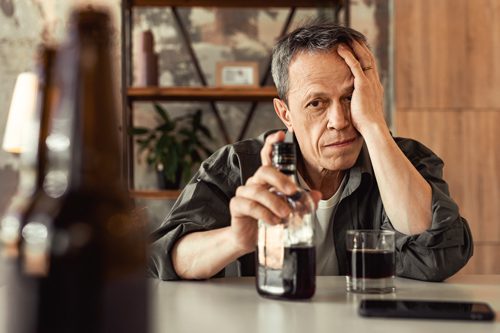
Binge Drinking Defined
According to an article on PSYCOM, binge drinking occurs when alcohol is consumed in a pattern that results in the person’s blood alcohol concentration, or BAC, being 0.08 grams percent or higher. For a man that would be drinking about five drinks in approximately a time span of two hours. For a woman, it would be roughly four drinks in about the same time span. For those 60 years old and older, it is defined as having three drinks a day for men and two drinks per day for women.
A drink is considered to be:
- One 1.5-ounce serving (a shot) of all sweetened liqueurs and unsweetened liquors
- One 12-ounce serving of beer
- One 5-ounce serving of wine
Who Binge Drinks?
Binge drinking is not limited to any specific age group or gender. Although it is most common in people aged 18 to 34, those aged 35 and over consume more than 50 percent of all the binge drinks. It may surprise you to find out that according to the Centers for Disease Control and Prevention (CDC), about four times a month one in six adults in the United States binge drinks an average of seven drinks each time. That is 467 drinks per person annually, totaling 17 billion binge drinks per year.
The article also included these additional facts regarding binge drinking:
- Binge drinking is more common in people with higher educational levels and household incomes of $75,000 or more.
- Binge drinkers with lower educational levels and incomes drink more binge drinks each year.
- Men consume four in five total binge drinks and are twice as likely to binge as women.
- Among those adults in the United States who drink excessively, 90% report that they have binged within the last thirty days.
- Most of the people under the age of 21 who consume alcohol say they binge drink. When they do, they often drink large amounts of alcohol.
Why Do People Binge Drink?
People binge drink for many different reasons. Sometimes it is because they feel anxious or uncomfortable in social settings, or they feel social pressure. They may drink to forget their problems or simply to have fun and get high with their friends. Other people binge drink alone. They want to keep their drinking a secret from their loved ones. Some younger people may feel pressure from their peers at certain events such as parties, sporting events, or proms. Others enjoy playing drinking games.
The Dangers of Binge Drinking
According to Healthline, even one night of binge drinking can have serious effects on your brain and your body. When a pattern of binging develops over time, serious and permanent damage can occur in specific parts of the brain that affect how the person practices self-control and experiences pleasure. When this happens, the person finds it more difficult to say no to alcohol, which often leads to alcohol addiction.
Binge drinking is linked to many health problems and injuries resulting from car accidents, burns, falls, and alcohol poisoning. It is often the underlying cause of violence including homicide, sexual assault, intimate partner violence, and suicide. Sometimes it results in sexually transmitted diseases or unintended pregnancies that often have poor outcomes, such as miscarriage and stillbirth. Babies often have fetal alcohol spectrum disorders or die of sudden infant death syndrome.
Binge drinking can have serious and even deadly effects on your body.
- Heavy drinking can cause an irregular heartbeat, high blood pressure, stroke, or death from sudden a heart attack.
- Alcohol use has been linked to several types of cancers including mouth, voice box, throat, esophagus, breast, liver, colon, and rectum.
- Alcohol can lead to infection or inflammation of the lungs because it inhibits the gag reflex. This can allow saliva, vomit, or other substances to enter the lungs.
- Alcohol use can lead to dehydration because it is a diuretic and causes more urine to be produced by the kidneys. This combined with vomiting can lead to extremely dangerous low levels of potassium, sodium, and other salts and minerals.
- Heavy alcohol use even one time can lead to hypoglycemia, which is dangerously low blood sugar.
Binge drinking can also cause learning and memory problems, anxiety, depression, and psychosis.
Help Is Available
If you or a loved one is misusing drugs or alcohol or struggling with an alcohol or drug addiction, you are not alone. Call and speak to a professional at English Mountain Recovery, located in the Smoky Mountains of Tennessee. We will answer your questions and help you start your journey to living a clean and sober life.
 To learn more about programs offered at English Mountain Recovery, alcoholism treatment in Tennessee, call and speak with someone today at (877) 615-8569. We are ready to help you or your loved one recover.
To learn more about programs offered at English Mountain Recovery, alcoholism treatment in Tennessee, call and speak with someone today at (877) 615-8569. We are ready to help you or your loved one recover.About the Author: 
Terry Hurley is a retired educational professional and freelance writer with more than fifty years of experience. A former reading specialist and learning center director, Terry loved her years working with children in the educational field. She has written extensively for print and online publications specializing in education and health issues. For the last six years, her writing focus has been on addiction and mental health issues.




